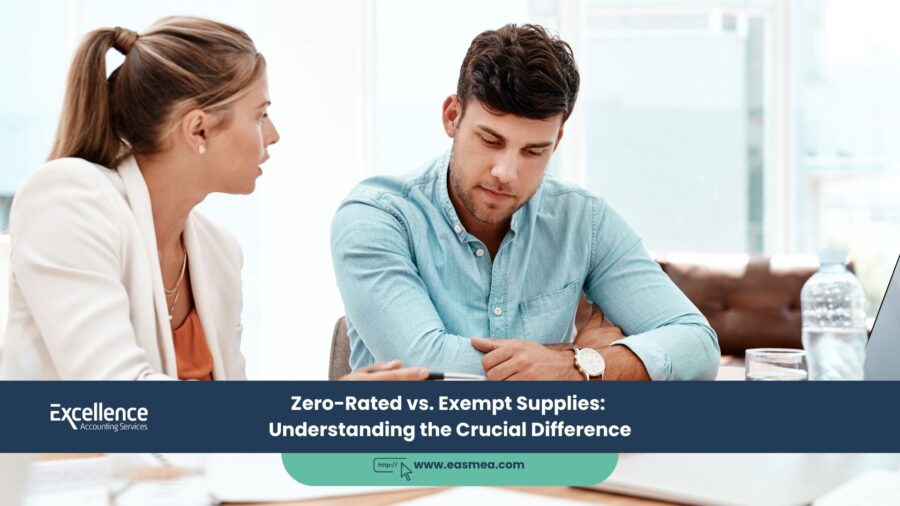Zero-Rated vs. Exempt Supplies in UAE VAT: A Crucial Guide for Businesses
In the world of UAE Value Added Tax (VAT), not all supplies are created equal. While many transactions are subject to the standard 5% rate, two special categories—zero-rated and exempt supplies—often cause significant confusion for businesses. On the surface, they appear similar: in both cases, you don’t charge VAT to your customer. However, beneath this similarity lies a fundamental difference that has profound implications for your cash flow, profitability, and overall compliance.
- Zero-Rated vs. Exempt Supplies in UAE VAT: A Crucial Guide for Businesses
- What Are Zero-Rated Supplies?
- What Are Exempt Supplies?
- The Crucial Difference: Impact on Your Bottom Line
- The Challenge of Mixed Supplies & Partial Exemption
- How Excellence Accounting Services (EAS) Provides Clarity
- Frequently Asked Questions (FAQs)
- Navigate VAT Complexity with Confidence.
Misunderstanding the distinction between zero-rated and exempt is one of the most common and costly mistakes a business can make. It can lead to incorrect VAT recovery, flawed pricing strategies, and potential penalties from the Federal Tax Authority (FTA). Whether you are in healthcare, real estate, finance, or international trade, a clear grasp of this concept is not just an accounting technicality—it’s a cornerstone of sound financial management.
This guide will demystify the difference between zero-rated and exempt supplies. We will break down what each category entails, explore the critical impact on your ability to recover VAT on your expenses (input tax), and provide practical examples. Furthermore, we’ll explain how expert VAT consultancy can help you navigate the complexities, especially if your business deals in a mix of supply types.
Key Takeaways
- The Core Difference is Input Tax Recovery: This is the most crucial point. With zero-rated supplies, you can recover the VAT paid on your business expenses. With exempt supplies, you cannot.
- Zero-Rated is Taxable (at 0%): A zero-rated supply is considered a “taxable supply” at a rate of 0%. This keeps you within the VAT system, allowing you to claim input tax credits.
- Exempt is Non-Taxable: An exempt supply is not considered a taxable supply. For these transactions, your business operates as if it’s outside the VAT system, preventing input tax recovery.
- Impact on Profitability: For exempt businesses, unrecoverable VAT on expenses becomes a direct cost, which can reduce profit margins or necessitate higher customer prices.
- Partial Exemption is Complex: Businesses making both taxable (standard or zero-rated) and exempt supplies must apportion their input tax, a complex process that requires careful calculation and robust accounting and bookkeeping.
What Are Zero-Rated Supplies?
Think of a zero-rated supply as being fully inside the VAT system. It is officially classified as a “taxable supply,” but the rate of VAT applied is simply 0%. Because it’s a taxable supply, the business making it is entitled to recover all the VAT it incurs on its related costs and expenses (input tax).
The government typically applies a zero rate to specific goods and services to support key economic sectors, encourage exports, and ensure essential goods remain affordable without burdening suppliers with hidden taxes.
Common Examples of Zero-Rated Supplies in the UAE:
- Exports of Goods and Services: Goods and services exported to outside the UAE.
- International Transportation: The supply of international air, sea, and land transport for passengers and goods.
- Certain Healthcare Services: The supply of specific preventive and basic healthcare services and related goods.
- Certain Educational Services: The supply of education services by recognized institutions (from pre-primary to higher education).
- Investment-Grade Precious Metals: The first supply of gold, silver, and platinum of a certain purity.
- Newly Constructed Residential Properties: The first supply (sale or lease) of a new residential building.
A business making only zero-rated supplies charges 0% VAT to its customers but can claim a refund from the FTA for the 5% VAT it pays on its expenses like rent, utilities, and office supplies.
What Are Exempt Supplies?
An exempt supply is a supply of goods or services on which no VAT is charged, and, crucially, for which the supplier cannot recover the VAT incurred on related costs. For these transactions, the business is effectively treated as the final consumer and must absorb the VAT on its expenses as an additional cost.
Supplies are typically made exempt for policy reasons, either because they are considered a social necessity or because it is technically difficult to apply VAT to them.
Common Examples of Exempt Supplies in the UAE:
- Certain Financial Services: Specifically margin-based products like interest on loans and credit cards. Fee-based financial services are generally standard-rated.
- Subsequent Supplies of Residential Properties: The sale or lease of a residential property after its first supply.
- Supply of Bare Land: The sale or lease of vacant land.
- Local Passenger Transport: The supply of local transport services like a city bus or metro.
The Crucial Difference: Impact on Your Bottom Line
The ability to recover input tax is the defining difference and has a direct impact on your business’s financial health. Let’s illustrate with a simple comparison.
| Feature | Zero-Rated Supplies | Exempt Supplies |
|---|---|---|
| VAT Charged to Customer | 0% | No VAT is charged |
| Considered a “Taxable Supply”? | Yes | No |
| Can you recover VAT on expenses (Input Tax)? | Yes, fully recoverable. | No, not recoverable. |
| Impact on Business Costs | VAT on expenses is reclaimed from the FTA, resulting in no net cost to the business. | VAT on expenses is absorbed by the business, becoming a direct cost that reduces profit. |
| VAT Registration Requirement | You MUST register for VAT if your zero-rated supplies exceed the mandatory threshold of AED 375,000. | You are NOT required to register for VAT if you only make exempt supplies. |
The Challenge of Mixed Supplies & Partial Exemption
Life is rarely simple, and many businesses make a combination of supplies. For example, a bank provides exempt loans but also offers standard-rated consultancy services. A real estate developer might have zero-rated first sales of new homes, standard-rated commercial property sales, and exempt residential rentals.
When a business makes both taxable (standard or zero-rated) and exempt supplies, it enters the complex world of **partial exemption**. In this scenario, you cannot recover all your input tax. You must apportion it:
- Input tax directly related to your taxable supplies is fully recoverable.
- Input tax directly related to your exempt supplies is not recoverable at all.
- Input tax on general overheads and shared costs (like rent, utility bills, or audit fees) must be split. You can only recover the portion that relates to your taxable activities.
Calculating this apportionment requires a specific, FTA-approved formula and meticulous record-keeping. Getting this wrong is a major compliance risk and is an area where professional VAT return filing services are highly recommended.
How Excellence Accounting Services (EAS) Provides Clarity
Navigating the nuances of VAT classification and apportionment is a significant challenge. At EAS, we provide specialized VAT services to ensure you are not only compliant but also financially optimized.
- VAT Supply Classification: Our experts will conduct a full review of your revenue streams to accurately classify every good and service you provide as standard-rated, zero-rated, or exempt.
- Partial Exemption Management: We manage the complex calculations for input tax apportionment, ensuring you recover the maximum amount of VAT legally possible while maintaining full compliance.
- Strategic Business Consultancy: We advise on how business structuring and transaction flows can impact your VAT position, helping you make more tax-efficient decisions.
- VAT Registration and De-registration: We guide you on your registration obligations. For instance, we can assist with VAT registration if you make zero-rated supplies or advise on whether you are eligible if you make mixed supplies.
- FTA Audit Assistance: In the event of an audit, our team will prepare all necessary documentation and liaise with the FTA on your behalf, leveraging our expertise in defending your VAT positions.
Frequently Asked Questions (FAQs)
No. A business that *only* makes exempt supplies cannot register for VAT because it does not make any “taxable supplies.” To be eligible for voluntary registration, your taxable supplies (standard-rated or zero-rated) or taxable expenses must exceed the voluntary threshold of AED 187,500.
This is a serious error. If you classify an exempt supply as zero-rated, you would incorrectly reclaim input VAT on related costs. If the FTA discovers this during an audit, they will disallow the wrongly claimed input tax. You would be required to pay this amount back to the FTA, likely along with significant administrative penalties for filing an incorrect tax return.
This is a policy decision. International transport is zero-rated to make the UAE an attractive global logistics and travel hub, ensuring that UAE-based transport providers are competitive on the world stage without an embedded tax cost. Local passenger transport is made exempt as a social policy, to keep the cost of daily commuting low for the general population.
Your office rent is a general overhead. The input VAT you pay on your rent cannot be fully recovered. You must use the partial exemption apportionment method. You would calculate the percentage of your total revenue that comes from taxable supplies (your zero-rated exports) and apply that percentage to the VAT on your rent to determine the recoverable amount. This calculation must be done for each tax period.
The UAE VAT legislation specifies that only certain “basic and preventive” healthcare services are zero-rated. This typically includes general practitioner consultations, dental check-ups, and specific government-approved treatments and medicines. However, other services, such as cosmetic procedures, are subject to the standard 5% VAT. It is absolutely critical to have a specialist review your service list against the detailed regulations to ensure correct classification. A mistake here could lead to under-collecting VAT from patients.
Absolutely. If you make exempt supplies, the unrecoverable input VAT is a real cost to your business. You must factor this cost into your pricing to protect your profit margins. In contrast, a business making zero-rated supplies does not have this “sticky” tax cost, as all input VAT is recovered, allowing for more competitive pricing.
Both require you to keep standard financial records for at least 5 years. However, for a business with mixed or zero-rated supplies, the requirements are more stringent. Your accounting system must be able to clearly distinguish between zero-rated, exempt, and standard-rated transactions. For partial exemption, you must maintain detailed records supporting your apportionment calculations, which an auditor will scrutinize heavily.
It depends on the type of building. A commercial building (office, retail shop) is always standard-rated at 5%. For a residential building, the treatment is different: the first sale of a brand-new residential building is zero-rated. Any subsequent sale of that same residential building is exempt from VAT.
Yes, in principle. Since you charge 0% VAT to customers (0 output tax) but pay 5% VAT on your expenses (positive input tax), you will be in a net refundable position on your VAT return. You will file the return and then apply to the FTA to have the net input tax credit refunded to your bank account.
From a purely financial perspective, it is almost always better to be making zero-rated supplies. The ability to recover input tax is a significant advantage that protects your business from absorbing tax as a cost. Being exempt might sound simple, but the hidden cost of unrecoverable VAT can be a substantial financial drag.
Conclusion: Knowledge is Your Best Defence
In the UAE’s VAT landscape, the line between zero-rated and exempt is fine but firm, with major consequences on either side. A clear understanding of this distinction is fundamental to maintaining compliance, managing cash flow effectively, and making strategic pricing decisions. Treating an exempt supply as zero-rated can lead to penalties, while treating a zero-rated supply as exempt means leaving money on the table by failing to recover input tax.
For any business dealing with non-standard supplies, seeking professional guidance is not an expense—it’s an investment in accuracy and peace of mind. Ensure your business is built on a compliant foundation by mastering this crucial VAT concept.
Navigate VAT Complexity with Confidence.
Let the expert team at Excellence Accounting Services review your revenue streams and provide the clarity you need to manage your VAT obligations effectively.




